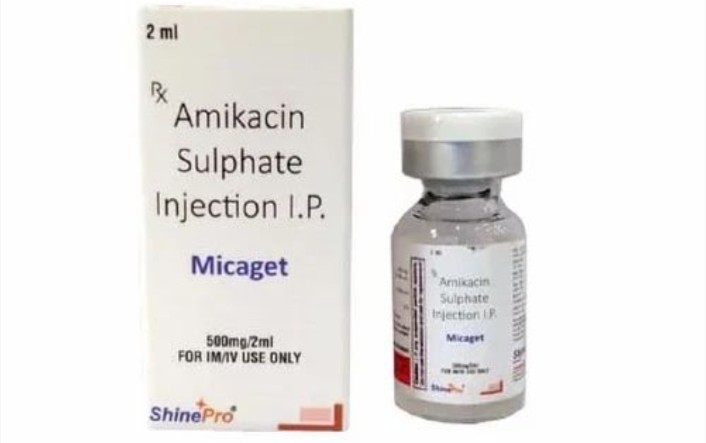
Amikacin
Description:
Amikacin is an aminoglycoside antibiotic used to treat serious bacterial infections, particularly those caused by Gram-negative bacteria. It works by inhibiting bacterial protein synthesis, leading to the death of the bacteria. It is typically reserved for infections that do not respond to other antibiotics due to its potential toxicity.
Available Brand Names (Varies by region, examples include):
- Amikacin Sulfate Injection
- Amikin
- Biocin
- Mikacin
- Acinil
Available Forms and Strengths:
- Injection (IV/IM): 50 mg/mL, 250 mg/mL, 500 mg/2 mL
- Vials: 100 mg, 500 mg, 1 g
Amikacin is typically administered intravenously (IV) or intramuscularly (IM) because oral absorption is poor.
Uses:
- Treatment of severe Gram-negative infections, such as urinary tract infections (UTIs), respiratory tract infections, intra-abdominal infections, bacteremia, sepsis, and bone/joint infections.
- Often used in combination with other antibiotics for synergistic effects.
Side Effects:
- Nephrotoxicity (kidney damage)
- Ototoxicity (hearing damage, especially high-pitched sounds)
- Dizziness or vertigo
- Muscle weakness
- Allergic reactions
- Neuromuscular blockade (rare but serious)
- Injection site reactions
Dosage:
- Adults:
- 7.5 mg/kg every 12 hours or 15 mg/kg once daily.
- Duration depends on the severity and type of infection, usually 7-10 days.
- Pediatric: Dosages are weight-based, often similar to adults but monitored more closely for toxicity.
Contraindications:
- Hypersensitivity to amikacin or other aminoglycosides.
- Patients with pre-existing renal impairment (use with caution, may require dose adjustment).
- Myasthenia gravis (can exacerbate muscle weakness).
- Pregnancy (may cause harm to the fetus, used only if necessary).
Drug Interactions:
- Other nephrotoxic drugs (e.g., vancomycin, NSAIDs, amphotericin B) – increased risk of kidney damage.
- Loop diuretics (e.g., furosemide) – increased risk of ototoxicity.
- Neuromuscular blocking agents – may increase muscle paralysis.
- Cephalosporins – may increase nephrotoxicity risk when used concurrently.
Warnings/Precautions:
- Regular monitoring of kidney function (serum creatinine) and hearing is essential during treatment.
- Use with caution in elderly patients due to the increased risk of nephrotoxicity.
- Periodic drug level monitoring (peak and trough levels) is recommended to ensure efficacy and minimize toxicity.
- Amikacin should be used cautiously in patients with pre-existing hearing loss, as it can exacerbate ototoxicity.
Doctor’s Advice:
- Follow prescribed dosages strictly.
- Complete the full course of antibiotics to prevent resistance.
- Inform your doctor if you experience hearing loss, dizziness, or changes in urination.
- Avoid other nephrotoxic or ototoxic drugs unless recommended by your healthcare provider.
Would you like more information about its mechanism of action or specifics on its use for certain infections?






